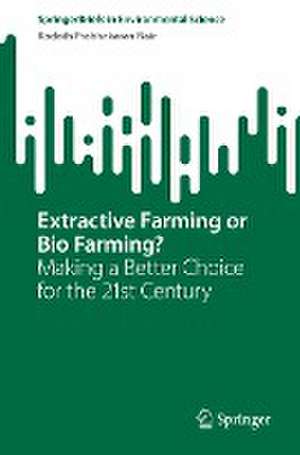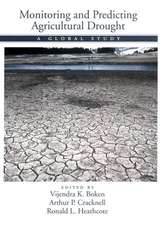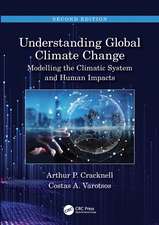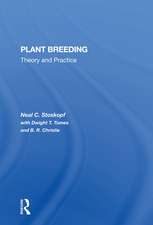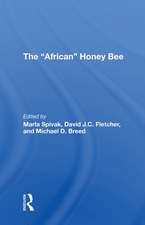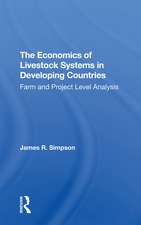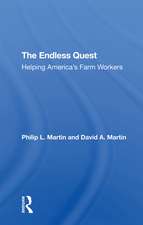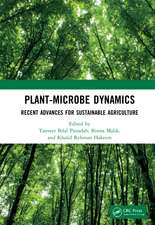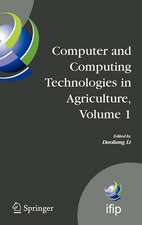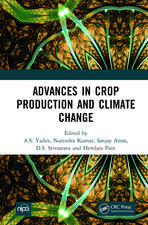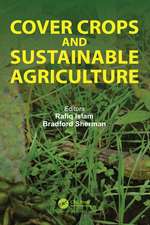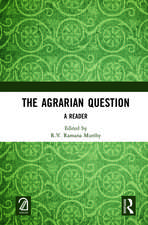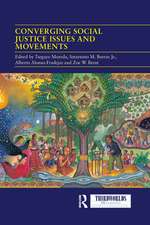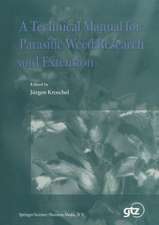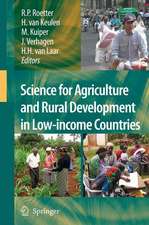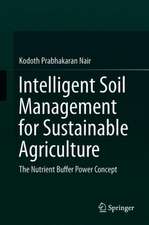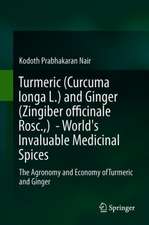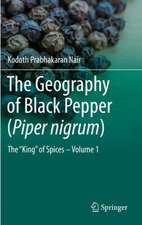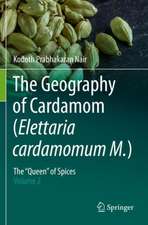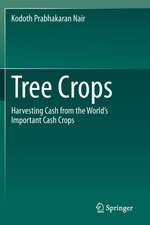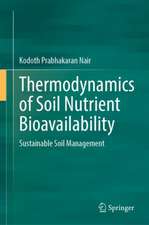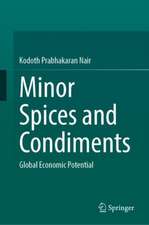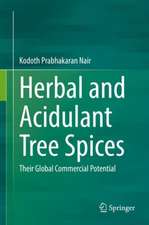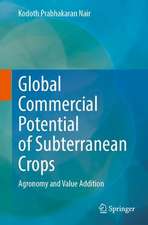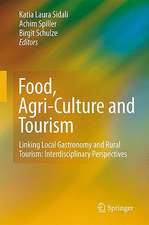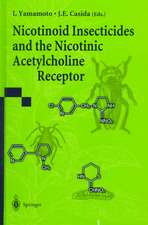Extractive Farming or Bio Farming?: Making a Better Choice for the 21st Century: SpringerBriefs in Environmental Science
Autor Kodoth Prabhakaran Nairen Limba Engleză Paperback – 25 iun 2023
One significant impact of this issue is that as usual, people in the disadvantaged nations will bear the brunt of the consequences. Approximately two-thirds of the seriously eroded land is located in Asia and Africa, with around 25% of the cropped land in Central America being moderately to severely damaged. The percentage of affected land in North America is relatively low, at only 4.4%. Soil degradation is the primary cause for the dramatic decline in food production in 80 developing countries during the past decade, with nearly 40% of global farming conducted on small parcels of land measuring 1 hectare or less. This situation is characterized by ignorance and poverty. In India alone, more than 120.40 million hectares of the total 328.73 million hectares of geographical area have suffered from degraded soils due to the green revolution. The State of Punjab, known as the “cradle of Indian green revolution” is a clear example of this environmental hazard, specifically in relation to soil resources. Thousands of hectares in this region cannot sustain plant growth without significant investment in soil reclamation, resulting in a substantial drain of national resources. All of this, proves beyond a shadow of doubt, the critical role that soil plays in human sustenance.
Din seria SpringerBriefs in Environmental Science
-
 Preț: 348.77 lei
Preț: 348.77 lei -
 Preț: 382.57 lei
Preț: 382.57 lei -
 Preț: 378.12 lei
Preț: 378.12 lei -
 Preț: 378.80 lei
Preț: 378.80 lei -
 Preț: 381.98 lei
Preț: 381.98 lei -
 Preț: 347.80 lei
Preț: 347.80 lei - 15%
 Preț: 464.18 lei
Preț: 464.18 lei -
 Preț: 378.12 lei
Preț: 378.12 lei -
 Preț: 377.53 lei
Preț: 377.53 lei -
 Preț: 379.09 lei
Preț: 379.09 lei -
 Preț: 381.00 lei
Preț: 381.00 lei -
 Preț: 383.93 lei
Preț: 383.93 lei -
 Preț: 175.58 lei
Preț: 175.58 lei -
 Preț: 475.83 lei
Preț: 475.83 lei -
 Preț: 380.07 lei
Preț: 380.07 lei -
 Preț: 378.92 lei
Preț: 378.92 lei -
 Preț: 411.93 lei
Preț: 411.93 lei -
 Preț: 375.62 lei
Preț: 375.62 lei -
 Preț: 375.45 lei
Preț: 375.45 lei -
 Preț: 378.92 lei
Preț: 378.92 lei -
 Preț: 377.57 lei
Preț: 377.57 lei -
 Preț: 377.35 lei
Preț: 377.35 lei -
 Preț: 378.34 lei
Preț: 378.34 lei -
 Preț: 344.67 lei
Preț: 344.67 lei -
 Preț: 374.30 lei
Preț: 374.30 lei -
 Preț: 362.43 lei
Preț: 362.43 lei -
 Preț: 446.26 lei
Preț: 446.26 lei - 5%
 Preț: 361.96 lei
Preț: 361.96 lei -
 Preț: 376.43 lei
Preț: 376.43 lei -
 Preț: 380.63 lei
Preț: 380.63 lei -
 Preț: 375.84 lei
Preț: 375.84 lei - 15%
 Preț: 463.20 lei
Preț: 463.20 lei -
 Preț: 383.33 lei
Preț: 383.33 lei -
 Preț: 375.23 lei
Preț: 375.23 lei -
 Preț: 377.57 lei
Preț: 377.57 lei -
 Preț: 381.59 lei
Preț: 381.59 lei -
 Preț: 379.48 lei
Preț: 379.48 lei -
 Preț: 376.04 lei
Preț: 376.04 lei -
 Preț: 413.84 lei
Preț: 413.84 lei -
 Preț: 381.81 lei
Preț: 381.81 lei -
 Preț: 352.28 lei
Preț: 352.28 lei -
 Preț: 381.81 lei
Preț: 381.81 lei -
 Preț: 381.98 lei
Preț: 381.98 lei - 5%
 Preț: 331.65 lei
Preț: 331.65 lei -
 Preț: 375.62 lei
Preț: 375.62 lei -
 Preț: 377.95 lei
Preț: 377.95 lei -
 Preț: 413.45 lei
Preț: 413.45 lei -
 Preț: 267.19 lei
Preț: 267.19 lei -
 Preț: 373.73 lei
Preț: 373.73 lei -
 Preț: 375.62 lei
Preț: 375.62 lei
Preț: 375.23 lei
Nou
Puncte Express: 563
Preț estimativ în valută:
71.80€ • 74.97$ • 59.29£
71.80€ • 74.97$ • 59.29£
Carte tipărită la comandă
Livrare economică 15-29 aprilie
Preluare comenzi: 021 569.72.76
Specificații
ISBN-13: 9783031346941
ISBN-10: 3031346947
Pagini: 55
Ilustrații: XIII, 55 p. 1 illus. in color.
Dimensiuni: 155 x 235 mm
Greutate: 0.11 kg
Ediția:1st ed. 2023
Editura: Springer Nature Switzerland
Colecția Springer
Seria SpringerBriefs in Environmental Science
Locul publicării:Cham, Switzerland
ISBN-10: 3031346947
Pagini: 55
Ilustrații: XIII, 55 p. 1 illus. in color.
Dimensiuni: 155 x 235 mm
Greutate: 0.11 kg
Ediția:1st ed. 2023
Editura: Springer Nature Switzerland
Colecția Springer
Seria SpringerBriefs in Environmental Science
Locul publicării:Cham, Switzerland
Cuprins
See attachments
Notă biografică
Kodoth Prabhakaran Nair is a highly respected international agricultural scientist with over three decades of experience working in Europe, Africa and Asia. During his illustrious career, he has held numerous esteemed academic positions, including the National Chair of the Science Foundation at the Royal Society in Belgium, Professor and Head of the Department of Agriculture, Soil Sciences and Basic Sciences at the University Center in the Republic of Cameroon, and Senior Professor at the University of Fort Hare in the Republic of South Africa – the alma mater of the late Nelson Mandela and where he began his fight against apartheid. Professor Nair is globally renowned for his groundbreaking work in developing “The Nutrient Buffer Power Concept”, a revolutionary soil management technique that is transforming the face of modern farming in the developing world. He has been honored with several national and international awards for developing this concept andwas nominated for the 2021 Volvo Environment Prize. He is also the author of ten books, including "Issues in National and International Agriculture", which was launched by India’s great President, the late Dr. A.P.J. Abdul Kalam in Raj Bhavan, Chennai, India. He has received seven invitations to contribute invitational chapters to Advances in Agronomy, the magnum opus of agricultural science, a world record. He is also a Senior Fellow of the world renowned Alexander von Humboldt Research Foundation, the Federal Republic of Germany and was recently elected a Fellow of the National Academy of Agricultural Sciences, India. Currently, he is pursuing global agricultural research and resides in Calicut, Kerala, India with his wife, Dr. Pankajam Nair, a nematologist trained in Europe.
Caracteristici
Discusses how damaged and degraded land could be restored Examines chemical-centric and extractive farming Highlights how soil degradation may contribute to global food shortages
